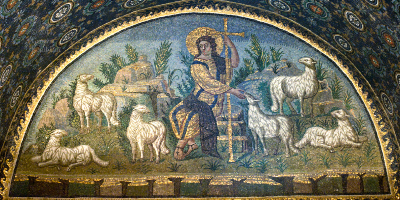Suetonius - Lives of the Twelve Ceasers (jan 1, 121 – dec 31, 121)
Description:
---Claudius 25---He rearranged the military career of the knights, assigning a division of cavalry after a cohort, and next the tribunate of a legion. He also instituted a series of military positions and a kind of fictitious service, which is called "supernumerary" and could be performed in absentia and in name only. He even had the Fathers pass a decree forbidding soldiers to enter the houses of senators to pay their respects. He confiscated the property of those freedmen who passed as Roman knights, and reduced to slavery again such as were ungrateful and a cause of complaint to their patrons, declaring to their advocates that he would not entertain a suit against their own freedmen. When certain men were exposing their sick and worn out slaves on the Island of Aesculapius because of the trouble of treating them, Claudius decreed that all such slaves were free, and that if they recovered, they should not return to the control of their master; but if anyone preferred to kill such a slave rather than to abandon him, he was liable to the charge of murder. He provided by an edict that travellers should not pass through the towns of Italy except on foot, or in a chair or litter. He stationed a cohort at Puteoli and one at Ostia, to guard against the danger of fires.
He forbade men of foreign birth to use the Roman names so far as those of the clans were concerned. Those who usurped the privileges of Roman citizenship he executed in the Esquiline field. He restored to the senate the provinces of Achaia and Macedonia, which Tiberius had taken into his own charge. He deprived the Lycians of their independence because of deadly intestine feuds, and restored theirs to the Rhodians, since they had given up their former faults. He allowed the people of Ilium perpetual exemption from tribute, on the ground that they were the founders of the Roman race, reading an ancient letter of the senate and people of Rome written in Greek to king Seleucus, in which they promised him their friendship and alliance only on condition that he should keep their kinsfolk of Ilium free from every burden. Since the Jews constantly made disturbances at the instigation of Chrestus, he expelled them from Rome. He allowed the envoys of the Germans to sit in the orchestra, led by their naïve self-confidence; for when they had been taken to the seats occupied by the common people and saw the Parthian and Armenian envoys sitting with the senate, they moved of their own accord to the same part of the theater, protesting that their merits and rank were no whit inferior. He utterly abolished the cruel and inhuman religion of the Druids among the Gauls, which under Augustus had merely been prohibited to Roman citizens; on the other hand he even attempted to transfer the Eleusinian rites from Attica to Rome, and had the temple of Venus Erycina in Sicily, which had falled to ruin through age, restored at the expense of the treasury of the Roman people. He struck his treaties with foreign princes in the Forum, sacrificing a pig and reciting the ancient formula of the fetial priests. But these and other acts, and in fact almost the whole conduct of his reign, were dictated not so much by his own judgment as that of his wives and freedmen, since he nearly always acted in accordance with their interests and desires.
---Nero 16---
He devised a new form for the buildings of the city and in front of the houses and apartments he erected porches, from the flat roofs of which fires could be fought; and these he put up at his own cost. He had also planned to extend the walls as far as Ostia and to bring the sea from there to Rome by a canal.
During his reign many abuses were severely punished and put down, and no fewer new laws were made: a limit was set to expenditures; the public banquets were confined to a distribution of food; the sale of any kind of cooked viands in the taverns was forbidden, with the exception of pulse and vegetables, whereas before every sort of dainty was exposed for sale. Punishment was inflicted on the Christians, a class of men given to a new and mischievous superstition. He put an end to the diversions of the chariot drivers, who from immunity of long standing claimed the right of ranging at large and amusing themselves by cheating and robbing the people. The pantomimic actors and their partisans were banished from the city.
Added to timeline:
Date:
jan 1, 121
dec 31, 121
~ 12 months
